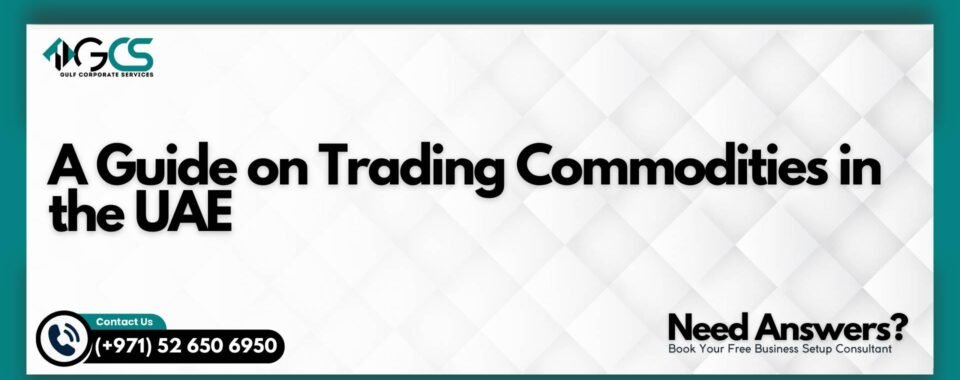
Trading commodities in the UAE is a fast-growing and rewarding opportunity for local and international investors. With its world-class infrastructure, favorable tax laws, and easy access to global markets, the UAE has become a major hub for commodity trading, including oil, gold, metals, and agricultural goods.
If you’re considering entering this market, here’s everything you need to know about how commodity trading in the UAE works, what licenses are needed, and how to get started successfully.
What is Commodity Trading?
Commodity trading involves buying and selling physical goods like crude oil, gold, silver, copper, wheat, and sugar. These are raw materials or primary agricultural products traded on exchanges or directly between buyers and sellers. You can trade these goods in spot markets or futures contracts, depending on your business model.
Types of Commodities Traded in the UAE
In the UAE, the most actively traded commodities include:
- Crude oil and petroleum products
- Gold and precious metals
- Agricultural products
- Natural gas
- Industrial metals like aluminum and copper
The UAE’s position as a logistics hub makes it a powerful player in the global commodity market.
Why Trade Commodities in the UAE?
The UAE offers a strong ecosystem for commodity trading, with supportive policies, international connectivity, and access to major trading zones.
Strategic Global Location
Located between Europe, Asia, and Africa, the UAE serves as a bridge for international trade. Major ports like Jebel Ali and Khalifa Port offer seamless import and export routes.
Tax Benefits
The UAE offers 0% personal income tax and no tax on capital gains, making it one of the most attractive destinations for global traders and investors.
Regulated and Transparent Market
Commodities are traded under the supervision of trusted authorities like the Securities and Commodities Authority (SCA) and free zones like DMCC (Dubai Multi Commodities Centre), ensuring transparency and investor protection.
Legal Requirements for Commodity Trading in the UAE
To legally operate a commodity trading company in the UAE, you must obtain a business license and meet specific regulatory conditions.
Choose the Right Jurisdiction
You can set up your commodity trading business in:
- Mainland UAE
- Free Zones such as DMCC, RAKEZ, or ADGM
Each location offers different benefits in terms of ownership, capital requirements, and trading permissions.
Obtain a Trade License
A General Trading License or a Commodity Trading License is required to operate legally. This license allows the buying, selling, and distribution of various physical goods locally and internationally.
Steps to Start a Commodity Trading Business in the UAE
Setting up a business for commodity trading in the UAE involves several important steps.
Define Your Trading Activity
Identify which commodities you plan to trade. Your activity must be clearly stated on your trade license application.
Select a Business Location
Choose between Mainland or Free Zone setup based on your target market and ownership preferences.
Register a Company Name
Pick a legal trade name following the UAE’s naming guidelines and register it with the licensing authority.
Apply for the Trade License
Submit your application with the Department of Economic Development (DED) or relevant Free Zone authority, along with passport copies, proof of address, and other documents.
Open a Corporate Bank Account
Once licensed, open a business bank account to conduct all your trading transactions securely.
Benefits of Commodity Trading in the UAE
Trading commodities in the UAE opens the door to a wide range of opportunities for both individuals and corporations.
Access to Global Markets
Thanks to strong trade links, businesses in the UAE can export and import goods with ease to Europe, Asia, Africa, and beyond.
Business-Friendly Environment
The UAE is ranked high in global business indices due to its low regulations, tax incentives, and advanced infrastructure.
Secure and Regulated Platforms
You can trade on recognized platforms such as Dubai Gold and Commodities Exchange (DGCX), ensuring secure and compliant transactions.
Risks and Considerations in Commodity Trading
While the commodity trading business is promising, it comes with certain risks.
Market Volatility
Commodity prices are subject to global economic conditions, making them highly volatile. It’s essential to develop a strong risk management strategy.
Regulatory Compliance
Non-compliance with local laws, import/export restrictions, or licensing issues can result in fines or business suspension.
Popular Free Zones for Commodity Trading in the UAE
Some of the top free zones where commodity traders can set up include:
Dubai Multi Commodities Centre (DMCC)
Located in Jumeirah Lake Towers, DMCC is the world’s top Free Zone for commodity businesses, offering full foreign ownership, modern infrastructure, and access to trade financing.
Abu Dhabi Global Market (ADGM)
Ideal for international commodity firms and financial institutions, ADGM offers a common law legal system and a strong regulatory framework.
Ras Al Khaimah Economic Zone (RAKEZ)
RAKEZ is more cost-effective and suitable for SMEs in the commodity distribution and supply chain business.
Tips for Success in UAE Commodity Trading
If you’re entering this competitive market, here’s how to increase your chances of long-term success.
Build Strong Supplier Relationships
Reliable suppliers and logistics partners help ensure product quality and timely delivery—both critical in trading.
Stay Compliant and Updated
Stay current with UAE’s import/export laws, commodity-specific regulations, and VAT rules to avoid penalties.
Invest in Market Research
Understand market demand and supply trends. A sound knowledge of pricing, competition, and customer preferences helps make better decisions.
Conclusion
Commodity trading in the UAE is one of the most promising industries for investors and entrepreneurs looking for a secure, scalable, and profitable venture. With world-class infrastructure, tax advantages, and international market access, the UAE makes it easy to launch and grow your commodity trading business.
If you’re ready to begin, partnering with expert Business Setup Consultants in Dubai, UAE will help you start faster, comply with regulations, and focus on growing your trading empire.
FAQs
What is the minimum investment to start a commodity trading business in the UAE?
It varies by free zone and activity but can start from AED 15,000 to AED 50,000 for licensing and setup.
Can foreigners fully own a commodity trading company in the UAE?
Yes, especially in Free Zones like DMCC or ADGM where 100% foreign ownership is allowed.
Do I need a local partner for Mainland setup?
For some activities, a local service agent may be required, but full ownership is now allowed for many trading businesses.
Is there a specific license for oil and gas trading?
Yes, oil and gas require a separate approval and trading license from relevant UAE authorities.
How long does it take to get a commodity trading license?
The process can take from 7 to 21 working days depending on the jurisdiction and completeness of your documentation.








